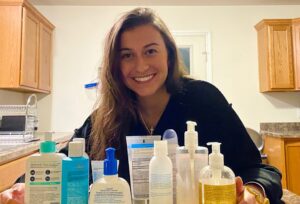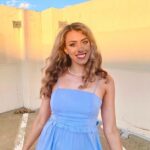Brands For a Safer Marketplace
 Our mission is to share about chemicals in everyday products that contribute to breast cancer because we are in a “window of susceptibility” (up through our first full term pregnancy) where exposure to endocrine disrupting chemicals and carcinogens can lead to a future diagnosis. As our advisers remind us, there is currently no way to confirm whether a product is completely safe for everyone. Every day new science is emerging. With that being said, we still want to provide our followers with safer alternatives to avoid chemicals of concern.
Our mission is to share about chemicals in everyday products that contribute to breast cancer because we are in a “window of susceptibility” (up through our first full term pregnancy) where exposure to endocrine disrupting chemicals and carcinogens can lead to a future diagnosis. As our advisers remind us, there is currently no way to confirm whether a product is completely safe for everyone. Every day new science is emerging. With that being said, we still want to provide our followers with safer alternatives to avoid chemicals of concern.
I am the Director of Business Development and the “meat, fish, and dairy category” researcher for Protect Our Breasts. On the National Executive Board, I work to grow our brand relationships within the natural products industry.
To create a safer marketplace, we partner with USDA Organic brands (NSF/ANSI-305 for cosmetics) to provide our following of Gen Zs and Millennials with safer alternatives. Before COVID-19, approved brands could donate sample products to be shared on our college and high school campuses across the U.S. and Canada. However due to the current restrictions we are not taking samples, instead we have adjusted to focus on social media campaigns/promotions. 60% of Gen Zs say they go on social media for product recommendations and 55% of Millennials agree.
Why not approve more brands? The tough part is that there are chemicals in packaging that can migrate into the product causing harm to our bodies. A product can be completely organic (containing virtually no chemicals of concern) but the plastic packaging may hold harmful chemicals such as phthalates that can leach into the clean product causing a negative chemical reaction. To make sure we can provide our followers with safer alternatives, we are only approving brands who are committed to working on their packaging.
My hope as I enter my senior year, my last year on the Executive Board, is to grow brand relationships with our current and new partners. With all the chaos occurring in the world today, we still believe we have the power to help create a safer marketplace.
The information provided herein is the author’s opinion. Our authors are not scientists. We are not providing medical advice, but simply sharing publicly available information. When we reference data and databases, we do so with the caveat that most are only as good as the data they are based on. While POB strives to make the information as timely and accurate as possible, we make no claims, promises, or guarantees about the completeness, or adequacy of the contents of any site that is shared, and expressly disclaims liability for errors and omissions in the contents of these sites. POB goes to great lengths to avoid declaring shared products as “safe” as there is no legal definition of the word “safe” at this time.

 Next Post
Next Post